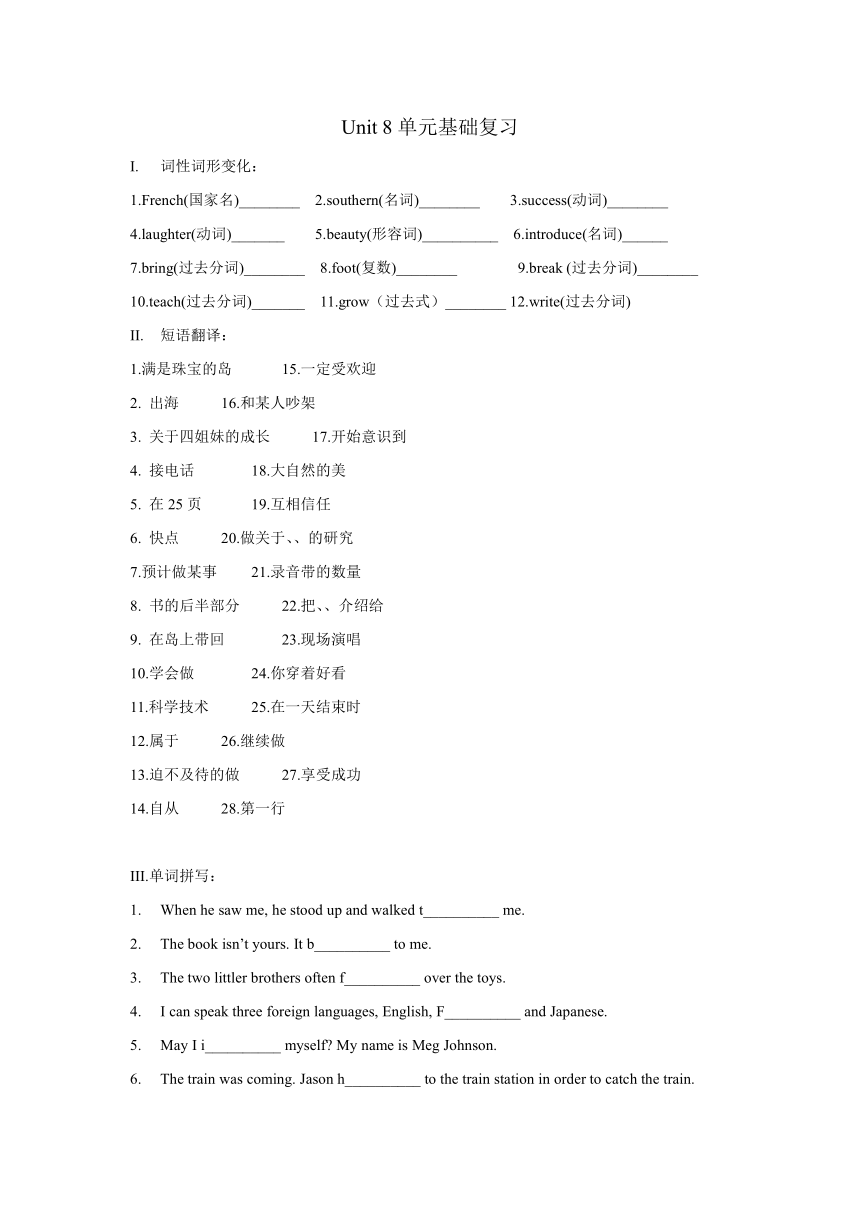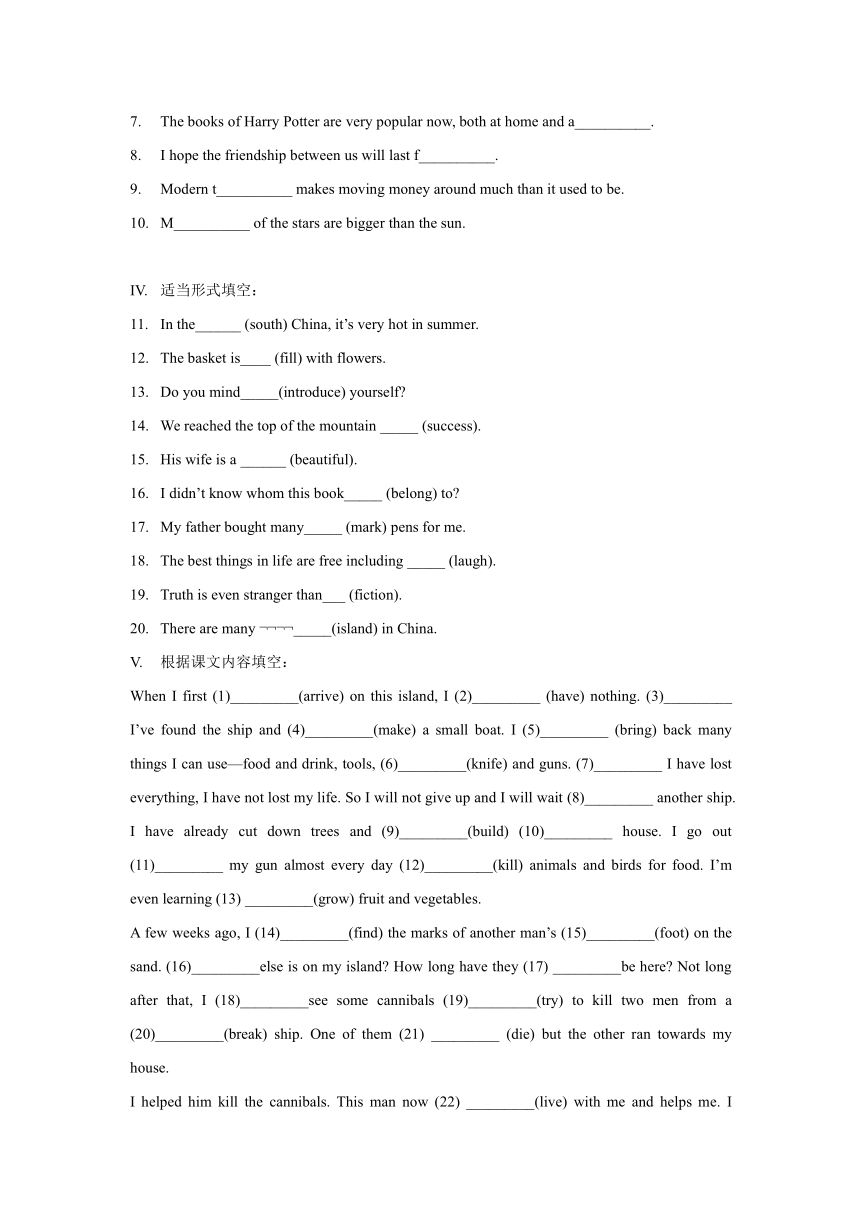Unit 8 Have you read Treasure Island yet?单元基础复习(含答案) 2024-2025学年人教版英语八年级下册
文档属性
| 名称 | Unit 8 Have you read Treasure Island yet?单元基础复习(含答案) 2024-2025学年人教版英语八年级下册 |

|
|
| 格式 | docx | ||
| 文件大小 | 26.3KB | ||
| 资源类型 | 教案 | ||
| 版本资源 | 人教新目标(Go for it)版 | ||
| 科目 | 英语 | ||
| 更新时间 | 2025-01-10 00:00:00 | ||
图片预览



文档简介
Unit 8单元基础复习
I. 词性词形变化:
1.French(国家名)________ 2.southern(名词)________ 3.success(动词)________
4.laughter(动词)_______ 5.beauty(形容词)__________ 6.introduce(名词)______
7.bring(过去分词)________ 8.foot(复数)________ 9.break (过去分词)________
10.teach(过去分词)_______ 11.grow(过去式)________ 12.write(过去分词)
II. 短语翻译:
1.满是珠宝的岛 15.一定受欢迎
2. 出海 16.和某人吵架
3. 关于四姐妹的成长 17.开始意识到
4. 接电话 18.大自然的美
5. 在25页 19.互相信任
6. 快点 20.做关于、、的研究
7.预计做某事 21.录音带的数量
8. 书的后半部分 22.把、、介绍给
9. 在岛上带回 23.现场演唱
10.学会做 24.你穿着好看
11.科学技术 25.在一天结束时
12.属于 26.继续做
13.迫不及待的做 27.享受成功
14.自从 28.第一行
III.单词拼写:
1. When he saw me, he stood up and walked t__________ me.
2. The book isn’t yours. It b__________ to me.
3. The two littler brothers often f__________ over the toys.
4. I can speak three foreign languages, English, F__________ and Japanese.
5. May I i__________ myself My name is Meg Johnson.
6. The train was coming. Jason h__________ to the train station in order to catch the train.
7. The books of Harry Potter are very popular now, both at home and a__________.
8. I hope the friendship between us will last f__________.
9. Modern t__________ makes moving money around much than it used to be.
10. M__________ of the stars are bigger than the sun.
IV. 适当形式填空:
11. In the______ (south) China, it’s very hot in summer.
12. The basket is____ (fill) with flowers.
13. Do you mind_____(introduce) yourself
14. We reached the top of the mountain _____ (success).
15. His wife is a ______ (beautiful).
16. I didn’t know whom this book_____ (belong) to
17. My father bought many_____ (mark) pens for me.
18. The best things in life are free including _____ (laugh).
19. Truth is even stranger than___ (fiction).
20. There are many _____(island) in China.
V. 根据课文内容填空:
When I first (1)_________(arrive) on this island, I (2)_________ (have) nothing. (3)_________ I’ve found the ship and (4)_________(make) a small boat. I (5)_________ (bring) back many things I can use—food and drink, tools, (6)_________(knife) and guns. (7)_________ I have lost everything, I have not lost my life. So I will not give up and I will wait (8)_________ another ship. I have already cut down trees and (9)_________(build) (10)_________ house. I go out (11)_________ my gun almost every day (12)_________(kill) animals and birds for food. I’m even learning (13) _________(grow) fruit and vegetables.
A few weeks ago, I (14)_________(find) the marks of another man’s (15)_________(foot) on the sand. (16)_________else is on my island How long have they (17) _________be here Not long after that, I (18)_________see some cannibals (19)_________(try) to kill two men from a (20)_________(break) ship. One of them (21) _________ (die) but the other ran towards my house.
I helped him kill the cannibals. This man now (22) _________(live) with me and helps me. I named him Friday (23) _________ that was the day I (24)_________(meet) him. He is smart and I have already (25)_________ (teach) him some English.
I. 词性词形变化
France
south
succeed
laugh
beautiful
introduction
brought
feet
broken
taught
grew
written
II. 短语翻译
an island full of treasures
go out to sea
about the growth of four sisters
answer the phone
on page 25
hurry up
be expected to do sth.
the second half of the book
bring back from the island
learn to do
science and technology
belong to
can't wait to do
ever since
be sure to be popular
argue with sb.
come to realize
the beauty of nature
trust each other
do research on...
the number of tapes
introduce... to...
sing live
look good on you
at the end of the day
continue to do/doing sth.
enjoy success
the first line
III. 单词拼写
towards(朝我走来,用 towards 表示方向)
belongs(belong to “属于”,主语 It 是第三人称单数,用 belongs)
fight(fight over“为…… 而争吵”,主语是 The two littler brothers,用原形 fight)
French(此处说会说的外语,French “法语”)
introduce(introduce oneself “自我介绍”,May 后用动词原形 introduce)
hurried(匆忙去某地,用 hurry to,句子是一般过去时,用 hurried)
abroad(both at home and abroad “国内外”)
forever(希望友谊长存,用 last forever)
technology(现代科技,用 technology)
Most(most of + 可数名词复数,表示 “…… 中的大多数”)
IV. 适当形式填空
southern(修饰名词 China 用形容词,southern “南方的”)
filled(be filled with “装满”,是固定短语)
introducing(mind doing sth.“介意做某事”,用 introducing)
successfully(修饰动词 reached 用副词,success 的副词形式是 successfully)
beauty(a 后接名词,beautiful 的名词形式是 beauty “美人”)
belonged(主句是一般过去时,宾语从句也用相应的过去时态,belong 的过去式是 belonged)
marking(marking pens “记号笔”,用现在分词作定语修饰 pens)
laughter(include 是动词,后接名词作宾语,laugh 的名词形式是 laughter “笑声”)
fiction(than 连接并列成分,与 Truth 并列,用名词 fiction “虚构的事”)
islands(many 后接可数名词复数,island 的复数形式是 islands)
V. 根据课文内容填空
arrived(根据 first 可知是描述过去初次到达岛上的情况,用一般过去时,arrive 的过去式是 arrived)
had(描述过去当时的情况,用一般过去时,have 的过去式是 had)
Although/Though(前后句是转折关系,用 Although/Though 引导让步状语从句,表示 “虽然”)
made(and 连接并列的谓语动词,与 found 并列,用 make 的过去式 made)
have brought(根据语境,从过去到现在带回了很多东西,用现在完成时,结构为 have/has + 过去分词,bring 的过去分词是 brought)
knives(knife 是可数名词,此处用复数形式 knives 与前面的 food and drink, tools 等并列)
Although/Though(前后句是转折关系,用 Although/Though 引导让步状语从句,表示 “虽然”)
for(wait for “等待”,是固定短语)
built(and 连接并列的谓语动词,与 cut down 并列,用 build 的过去式 built)
a(house 是可数名词单数,此处表示泛指 “一所房子”,用 a)
with(go out with sth.“带着…… 出去”,用 with)
to kill(此处用动词不定式作目的状语,表示出去带枪的目的是猎杀动物和鸟作食物)
to grow(learn to do sth.“学习做某事”,用 to grow)
found(描述过去发生的动作,用一般过去时,find 的过去式是 found)
feet(foot 的复数形式是 feet,此处表示另一个人的脚印)
Who(此处是疑问词,询问岛上还有谁,用 Who)
been(根据前面的 have 可知是现在完成时,have been here “来过这里”)
saw(描述过去的动作,用一般过去时,see 的过去式是 saw)
trying(see sb. doing sth.“看见某人正在做某事”,用现在分词 trying)
broken(修饰名词 ship 用形容词,broken “破损的”)
died(描述过去的动作,用一般过去时,die 的过去式是 died)
lives(根据 now 可知是一般现在时,主语 This man 是第三人称单数,谓语动词用第三人称单数形式 lives)
because(后面解释命名为 Friday 的原因,用 because 引导原因状语从句)
met(描述过去相遇的情况,用一般过去时,meet 的过去式是 met)
taught(根据前面的 have already 可知是现在完成时,用 teach 的过去分词 taught)
I. 词性词形变化:
1.French(国家名)________ 2.southern(名词)________ 3.success(动词)________
4.laughter(动词)_______ 5.beauty(形容词)__________ 6.introduce(名词)______
7.bring(过去分词)________ 8.foot(复数)________ 9.break (过去分词)________
10.teach(过去分词)_______ 11.grow(过去式)________ 12.write(过去分词)
II. 短语翻译:
1.满是珠宝的岛 15.一定受欢迎
2. 出海 16.和某人吵架
3. 关于四姐妹的成长 17.开始意识到
4. 接电话 18.大自然的美
5. 在25页 19.互相信任
6. 快点 20.做关于、、的研究
7.预计做某事 21.录音带的数量
8. 书的后半部分 22.把、、介绍给
9. 在岛上带回 23.现场演唱
10.学会做 24.你穿着好看
11.科学技术 25.在一天结束时
12.属于 26.继续做
13.迫不及待的做 27.享受成功
14.自从 28.第一行
III.单词拼写:
1. When he saw me, he stood up and walked t__________ me.
2. The book isn’t yours. It b__________ to me.
3. The two littler brothers often f__________ over the toys.
4. I can speak three foreign languages, English, F__________ and Japanese.
5. May I i__________ myself My name is Meg Johnson.
6. The train was coming. Jason h__________ to the train station in order to catch the train.
7. The books of Harry Potter are very popular now, both at home and a__________.
8. I hope the friendship between us will last f__________.
9. Modern t__________ makes moving money around much than it used to be.
10. M__________ of the stars are bigger than the sun.
IV. 适当形式填空:
11. In the______ (south) China, it’s very hot in summer.
12. The basket is____ (fill) with flowers.
13. Do you mind_____(introduce) yourself
14. We reached the top of the mountain _____ (success).
15. His wife is a ______ (beautiful).
16. I didn’t know whom this book_____ (belong) to
17. My father bought many_____ (mark) pens for me.
18. The best things in life are free including _____ (laugh).
19. Truth is even stranger than___ (fiction).
20. There are many _____(island) in China.
V. 根据课文内容填空:
When I first (1)_________(arrive) on this island, I (2)_________ (have) nothing. (3)_________ I’ve found the ship and (4)_________(make) a small boat. I (5)_________ (bring) back many things I can use—food and drink, tools, (6)_________(knife) and guns. (7)_________ I have lost everything, I have not lost my life. So I will not give up and I will wait (8)_________ another ship. I have already cut down trees and (9)_________(build) (10)_________ house. I go out (11)_________ my gun almost every day (12)_________(kill) animals and birds for food. I’m even learning (13) _________(grow) fruit and vegetables.
A few weeks ago, I (14)_________(find) the marks of another man’s (15)_________(foot) on the sand. (16)_________else is on my island How long have they (17) _________be here Not long after that, I (18)_________see some cannibals (19)_________(try) to kill two men from a (20)_________(break) ship. One of them (21) _________ (die) but the other ran towards my house.
I helped him kill the cannibals. This man now (22) _________(live) with me and helps me. I named him Friday (23) _________ that was the day I (24)_________(meet) him. He is smart and I have already (25)_________ (teach) him some English.
I. 词性词形变化
France
south
succeed
laugh
beautiful
introduction
brought
feet
broken
taught
grew
written
II. 短语翻译
an island full of treasures
go out to sea
about the growth of four sisters
answer the phone
on page 25
hurry up
be expected to do sth.
the second half of the book
bring back from the island
learn to do
science and technology
belong to
can't wait to do
ever since
be sure to be popular
argue with sb.
come to realize
the beauty of nature
trust each other
do research on...
the number of tapes
introduce... to...
sing live
look good on you
at the end of the day
continue to do/doing sth.
enjoy success
the first line
III. 单词拼写
towards(朝我走来,用 towards 表示方向)
belongs(belong to “属于”,主语 It 是第三人称单数,用 belongs)
fight(fight over“为…… 而争吵”,主语是 The two littler brothers,用原形 fight)
French(此处说会说的外语,French “法语”)
introduce(introduce oneself “自我介绍”,May 后用动词原形 introduce)
hurried(匆忙去某地,用 hurry to,句子是一般过去时,用 hurried)
abroad(both at home and abroad “国内外”)
forever(希望友谊长存,用 last forever)
technology(现代科技,用 technology)
Most(most of + 可数名词复数,表示 “…… 中的大多数”)
IV. 适当形式填空
southern(修饰名词 China 用形容词,southern “南方的”)
filled(be filled with “装满”,是固定短语)
introducing(mind doing sth.“介意做某事”,用 introducing)
successfully(修饰动词 reached 用副词,success 的副词形式是 successfully)
beauty(a 后接名词,beautiful 的名词形式是 beauty “美人”)
belonged(主句是一般过去时,宾语从句也用相应的过去时态,belong 的过去式是 belonged)
marking(marking pens “记号笔”,用现在分词作定语修饰 pens)
laughter(include 是动词,后接名词作宾语,laugh 的名词形式是 laughter “笑声”)
fiction(than 连接并列成分,与 Truth 并列,用名词 fiction “虚构的事”)
islands(many 后接可数名词复数,island 的复数形式是 islands)
V. 根据课文内容填空
arrived(根据 first 可知是描述过去初次到达岛上的情况,用一般过去时,arrive 的过去式是 arrived)
had(描述过去当时的情况,用一般过去时,have 的过去式是 had)
Although/Though(前后句是转折关系,用 Although/Though 引导让步状语从句,表示 “虽然”)
made(and 连接并列的谓语动词,与 found 并列,用 make 的过去式 made)
have brought(根据语境,从过去到现在带回了很多东西,用现在完成时,结构为 have/has + 过去分词,bring 的过去分词是 brought)
knives(knife 是可数名词,此处用复数形式 knives 与前面的 food and drink, tools 等并列)
Although/Though(前后句是转折关系,用 Although/Though 引导让步状语从句,表示 “虽然”)
for(wait for “等待”,是固定短语)
built(and 连接并列的谓语动词,与 cut down 并列,用 build 的过去式 built)
a(house 是可数名词单数,此处表示泛指 “一所房子”,用 a)
with(go out with sth.“带着…… 出去”,用 with)
to kill(此处用动词不定式作目的状语,表示出去带枪的目的是猎杀动物和鸟作食物)
to grow(learn to do sth.“学习做某事”,用 to grow)
found(描述过去发生的动作,用一般过去时,find 的过去式是 found)
feet(foot 的复数形式是 feet,此处表示另一个人的脚印)
Who(此处是疑问词,询问岛上还有谁,用 Who)
been(根据前面的 have 可知是现在完成时,have been here “来过这里”)
saw(描述过去的动作,用一般过去时,see 的过去式是 saw)
trying(see sb. doing sth.“看见某人正在做某事”,用现在分词 trying)
broken(修饰名词 ship 用形容词,broken “破损的”)
died(描述过去的动作,用一般过去时,die 的过去式是 died)
lives(根据 now 可知是一般现在时,主语 This man 是第三人称单数,谓语动词用第三人称单数形式 lives)
because(后面解释命名为 Friday 的原因,用 because 引导原因状语从句)
met(描述过去相遇的情况,用一般过去时,meet 的过去式是 met)
taught(根据前面的 have already 可知是现在完成时,用 teach 的过去分词 taught)
同课章节目录
- Unit 1 What's the matter?
- Section A
- Section B
- Unit 2 I'll help to clean up the city parks.
- Section A
- Section B
- Unit 3 Could you please clean your room?
- Section A
- Section B
- Unit 4 Why don't you talk to your parents?
- Section A
- Section B
- Unit 5 What were you doing when the rainstorm came
- Section A
- Section B
- Review of Units 1-5
- Unit 6 An old man tried to move the mountains.
- Section A
- Section B
- Unit 7 What's the highest mountain in the world?
- Section A
- Section B
- Unit 8 Have you read Treasure Island yet?
- Section A
- Section B
- Unit 9 Have you ever been to a museum?
- Section A
- Section B
- Unit 10 I've had this bike for three years.
- Section A
- Section B
